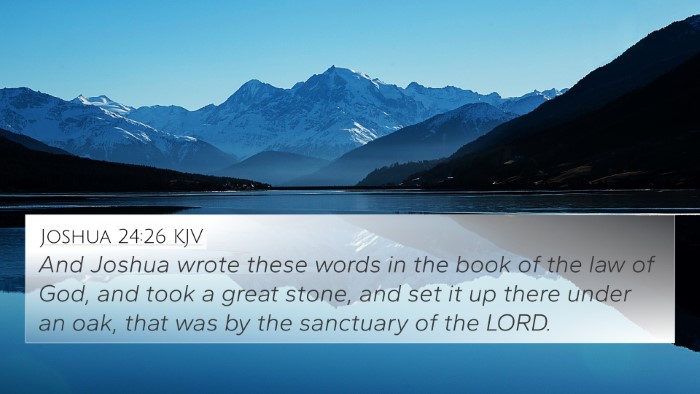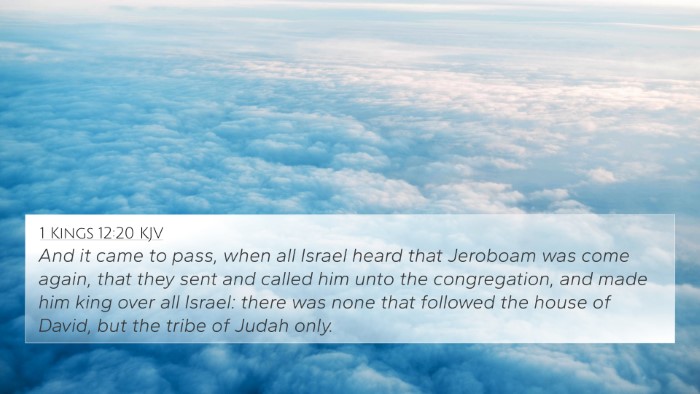Understanding Judges 9:6
Judges 9:6 states: "And all the men of Shechem gathered together, and all the house of Millo, and went, and made Abimelech king, by the oak of the pillar which was in Shechem." This verse marks the pivotal moment when Abimelech is proclaimed king, showcasing themes of leadership, loyalty, and the consequences of choices made by a community.
Verse Meaning and Context
This event occurs within the broader narrative of the Book of Judges, which illustrates Israel's turbulent history of leadership and governance, often devoid of divine direction. The selection of Abimelech reflects not just a political maneuver but also a deeper commentary on human desires for power and authority, as noted in the commentaries.
Commentary Insights
- Matthew Henry: He emphasizes the folly of the people of Shechem in choosing Abimelech as their leader, suggesting that their decision is rooted in their own desires for a strong and charismatic figure, rather than a suitable ruler who follows God's principles.
- Albert Barnes: Barnes draws attention to the social and political dynamics at play, explaining that the Israelites repeatedly sought rulers who would fulfill their earthly desires, neglecting the theocratic guidance they were meant to follow.
- Adam Clarke: Clarke analyzes the geographical significance of Shechem, noting that it was a center for covenantal gatherings. He suggests that the choice of location symbolizes a rejection of the spiritual covenant and a move towards secular governance.
Thematic Connections
The themes arising from Judges 9:6, such as the nature of leadership, the dangers of factionalism, and the mysterious workings of God's providence, resonate throughout the Bible. Below are several biblical cross-references that relate to this verse:
- 1 Samuel 8:5-7: The Israelites demand a king, demonstrating a longing for human leadership over divine rule.
- 1 Kings 12:16-20: The division of the kingdom illustrates the consequences of poor leadership choices, akin to those seen in Abimelech's ascent.
- Matthew 20:25-28: Jesus teaches about servant leadership, contrasting worldly ambitions with the humility expected of a true leader.
- Proverbs 29:2: "When the righteous are in authority, the people rejoice; but when the wicked bear rule, the people mourn." This verse connects the moral state of leaders with the wellbeing of the community.
- Jeremiah 23:1-4: A prophetic warning against irresponsible shepherds parallels Abimelech’s downfall, highlighting God's displeasure with corrupt leaders.
- Psalms 78:70-72: This passage refers to God appointing leaders who will lead the people with integrity, shedding light on the importance of righteous governance.
- Romans 13:1: Paul emphasizes that all governing authorities are established by God, which can be examined in the light of Abimelech's claim to power.
Inter-Biblical Dialogue
The examination of Judges 9:6 through various theological lenses enriches our understanding of leadership in a biblical context. The chosen leaders, whether righteous or not, are significant in both the Old and New Testaments, maintaining dialogues about authority, rebellion, and divine sovereignty.
Practical Reflection
When studying this verse and its implications, consider how it challenges contemporary views on leadership. Where do we see parallels in our world today? The importance of cross-referencing biblical texts becomes clear as it draws out deeper truths and invites meaningful connections between scripture and lived experiences.
Conclusion
Judges 9:6 serves as a reflective point on the nature of authority and decision-making within a community. By examining cross-referenced verses, believers can glean insights on the dynamic between divine will and human action, ultimately encouraging wise choices aligned with God’s teachings.
Tools for Cross-Referencing
Utilizing tools for Bible cross-referencing can enhance your study experience. Consider investing in a Bible concordance or a cross-reference Bible study guide that allows for exploration of connecting themes and verses. These resources can bridge the texts of the Old and New Testaments, enriching your understanding of parallels such as the one illustrated in Judges 9:6.








